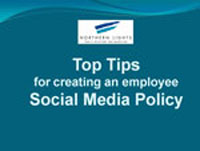Can I sack my employee for Facebook comments?
4 January 2012 By Northern Lights

 By Andrew Rayment, partner, Walker Morris
By Andrew Rayment, partner, Walker Morris
Just before Christmas I had the pleasure of being invited by Victoria Tomlinson of Northern Lights PR to talk at a seminar about employment issues and social media.
Facebook, LinkedIn and Twitter are hardly new, but the legal world is notoriously slow to react and is only now really getting to grips with social media. In truth, preparing for the seminar confirmed for me just what a fantastic but dangerous tool social media can be.
There is a noticeable trend in the queries I am receiving from businesses and that is an increase in concerns over employees’ use of social media. However, the seminar was fantastic in that it provided me with a real insight into what is specifically concerning businesses. I don’t propose to go into the myriad issues which were raised, but some of the more common were:
- One of my employees has being posting derogatory comments on Facebook what can I do?
- What can I do if the person is an ex-employee? How does that change things?
- Who owns LinkedIn contacts?
The first question is probably the most common and most concerning to businesses and it is often followed by: “can I discipline or dismiss the employee?” Unfortunately, the answer is: it depends! The simplest solution is to have a social media policy which sets out what your employees can and cannot do in relation to social media. It should also set out what disciplinary action may be taken if the employee breaches the policy. Such a policy will primarily act as a deterrent but when it is breached (which it invariably will be) it will allow business to discipline or dismiss their employees.
A fantastic example is Apple; it has a policy which bans employees from posting derogatory comments about the Apple brand. When it dismissed an employee for breaching the policy it was able to successfully defend the employee’s unfair dismissal claim.
Things are not so clear cut in respect of ex-employees. Businesses do not have the threat of disciplinary action or dismissal to deter ex-employees posting derogatory comments. Businesses can bring defamation claims or seek injunctions but the costs and difficulties associated with them can mean it simply isn’t an option, although the threat of such proceedings may be enough for the ex-employee to withdraw the posts. Perhaps the best solution is to create a work environment in which employees are happy and unlikely to post negative comments about the business.
What came out of the seminar was that businesses are aware of the benefits of social media and how important it can be in boosting business. However, at the same time they are very aware of just how damaging social media can be. No business wants to end up seeing a video of its employees on YouTube damaging its brand, or trending on Twitter for all the wrong reasons.
Victoria of course advocates the use of social media and the benefits it can offer to businesses. My problem as a lawyer is quite simple – social media is a huge risk, how can I minimise that risk. The truth is social media is a double-edged sword. It presents business with a host of opportunities which in today’s world of instant communication simply cannot be ignored. However, it opens up businesses to risks that simply were not a consideration 10 years ago. What Victoria and I can both agree on though, is that to get the most out of social media you need to manage it appropriately.
Think of it this way, you would never allow an employee to have access to a company car without insisting on them complying with the businesses’ policy. Social media is no different, if you are going to encourage the use of it, you must manage it appropriately so that when things go wrong, which invariably will happen, you have managed the risks, minimised the potential damage and can act quickly and decisively. The key point to remember is that you cannot realistically prevent an employee posting anything on Facebook, however, if you are adequately prepared and vigilant, appropriate action can be taken.
